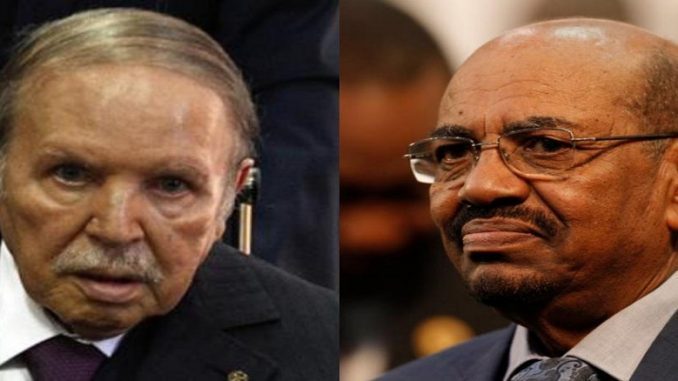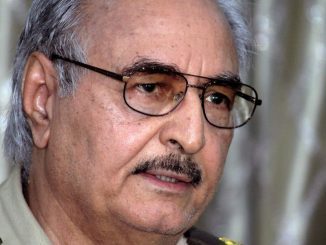
In the space of little more than a week, two long-ruling autocrats in the Arab world succumbed to people power. First, it was Algeria’s President Abdelaziz Bouteflika, the wheelchair-bound figurehead of an entrenched regime who bowed out in the face of mass protests last week after two decades in power. Then came news Thursday of Sudanese President Omar Hassan al-Bashir, who was placed under house arrest by the country’s military authorities after four months of ceaseless demonstrations in the streets. The move brought to an end Bashir’s 30-year rule, during which he ruthlessly cracked down on dissent, waged bloody — legal experts would say genocidal — counterinsurgencies and, over the past decade, evaded an international warrant for his arrest for crimes against humanity.
Protesters in Sudan and Algeria are deeply aware of the fragility of their present gains. What began as unrest over economic grievances morphed into a far-reaching clamor for political reform. Young people who have only known life under Bouteflika or Bashir will wake up Friday with both leaders gone and their nations poised for change. Though the situations differ, they share the same fear that the old guards of the ancien regime may snap back into place, halting the momentum of what appear to be pro-democracy uprisings in the mold of the upheavals that rocked the Arab world in 2011.
There’s the lesson of Egypt, where epochal protests in Cairo’s Tahrir Square eight years ago led to a reviled despot stepping down but an entrenched military establishment maintaining power. The top brass eventually presided over a vicious counterrevolution in 2013 led by Abdel Fatah al-Sissi, the country’s current president, who has since sent thousands of dissidents to prison and clamped down on the press and civil society. He is now coercing lawmakers to make him president for life.
Determined not to be the victims of the same forces of history, Algerians and the Sudanese are staying on the streets, calling for a wholesale removal, root to stem, of the autocratic regimes that have long dominated their societies. Their resolve will surely be tested in the weeks to come.
The shadow of Sissi hangs over the man who shoved Bashir aside — Sudanese Defense Minister Awad Ibn Auf. On Thursday, Auf, who was placed on a sanctions list by the United States in 2007 and indicted by the International Criminal Court in 2009 for his role in the genocide in Darfur, announced on state radio that he would be at the helm of a two-year transitional government.
His caretaker military administration would suspend the constitution and impose a three-month state of emergency, including a nighttime curfew. But by the evening in Khartoum, protesters massed on the streets in defiance of the curfew.
“They just replaced one thief with another,” Ahmad Ibrahim, a young protester at a sit-in outside of the army headquarters in Khartoum, told The Washington Post. “We are going to keep pushing until all of our demands are met.”
In a statement posted on Twitter, the Sudanese Professionals Association — an organization that includes doctors, lawyers, students and others who helped drive the protests — decreed that it did not accept “a coup” that would simply reproduce the status quo.
“Hold the squares and the roads that we liberated by force and courage until the handover of authority to a civilian transitional government that expresses the forces of the revolution,” the group posted on Twitter. “The ones who destroyed the country and killed its people are trying to steal every drop of blood and sweat that our great people shed in the revolution that has shaken the throne of tyranny.”
In Algeria, Bouteflika’s exit similarly was announced by Gen. Ahmed Gaid Salah, the head of the army, who indicated this week that the Algerian military would shepherd a three-month transition period, culminating in a presidential election on July 4. But protesters have vowed to continue until their wider demands for systemic reform are met.
“This is only the beginning of an uncertain political process,” Andrew Lebovich, a North Africa and Middle East expert with the European Council on Foreign Relations, told my colleague Sudarsan Raghavan. “I think protesters will demand much broader changes now that Bouteflika is gone, but we don’t yet know what form this will take.”
The prospect of repressive state violence still hangs over Sudan and Algeria, and may test the cohesion of the protest movements, which both draw wide a political and societal cross-section.
“There are entirely legitimate fears that the militaries . . . will now move to divide, and then violently crush, the popular protest movements that spurred these remarkable developments,” Amy Hawthorne, deputy director of research at the Project on Middle East Democracy, told Today’s WorldView. “It won’t be easy, but Algerian and Sudanese pro-democracy protesters need to stay unified around a core set of first-order demands about civilian-led democratic transitions and stay mobilized in the streets to press those demands.”
The risk may be less acute in Algeria, where few want a repeat of the traumatic civil war between the regime and Islamist forces that left as many as 200,000 people dead during the 1990s. But Sudan — riven by ethnic conflicts, dominated by a complex security apparatus of regime-affiliated paramilitary forces and tangled up in a mess of regional geopolitics — could be “at the precipice of bloodshed and turmoil,” wrote Alex de Waal, an expert on the Horn of Africa.
Analysts argue that the international community can play a key role in staving off further chaos. “If foreign friends of Algerians and Sudanese want to help them out, then they should encourage the effective powers in those countries to listen to the demands of their peoples and own up to the fact that the underlying structural problems that have faced those countries won’t be dismissed by the dismissal of a few political leaders,” H.A. Hellyer, a senior associate fellow at the Royal United Services Institute in London, told Today’s WorldView. “And, yes, that means conditioning financial assistance — which both countries are almost definitely going to need — on genuine advancements, as opposed to simple road maps.”
It’s less clear where that support may come from. Western leaders see the enduring strife in Syria and Libya and have largely accepted the mantra of stability preached by the Middle East’s Arab monarchies, which have moved in various ways to undermine the democratic transitions of other countries in the region. President Trump, too, has long rejected the appeal of the Arab Spring and welcomed Sissi to the White House this week as a leader doing a “great” job.
“The Sudanese and Algerian generals likely are counting on Russia and the Arab dictators to back them in crushing the pro-democracy movements, and on passivity or even tacit support from the Trump administration to restore order as well,” Hawthorne said.
The protest movements arrayed against them have proven to be resilient so far and refused to blink when Bouteflika and Bashir attempted to assuage their demands with half-measures. Looking on, the proponents of Egypt’s uprising can only wish them luck.
“The power of the people has proved to be alive, and the desire to have a president who does not stay for life,” Khaled Dawoud, an Egyptian journalist and former liberal politician, told the New York Times. “The model we set in 2011 remains alive despite the tremendous efforts to crush and distort it.
*By: Ishaan Tharoor – The Washington Post



